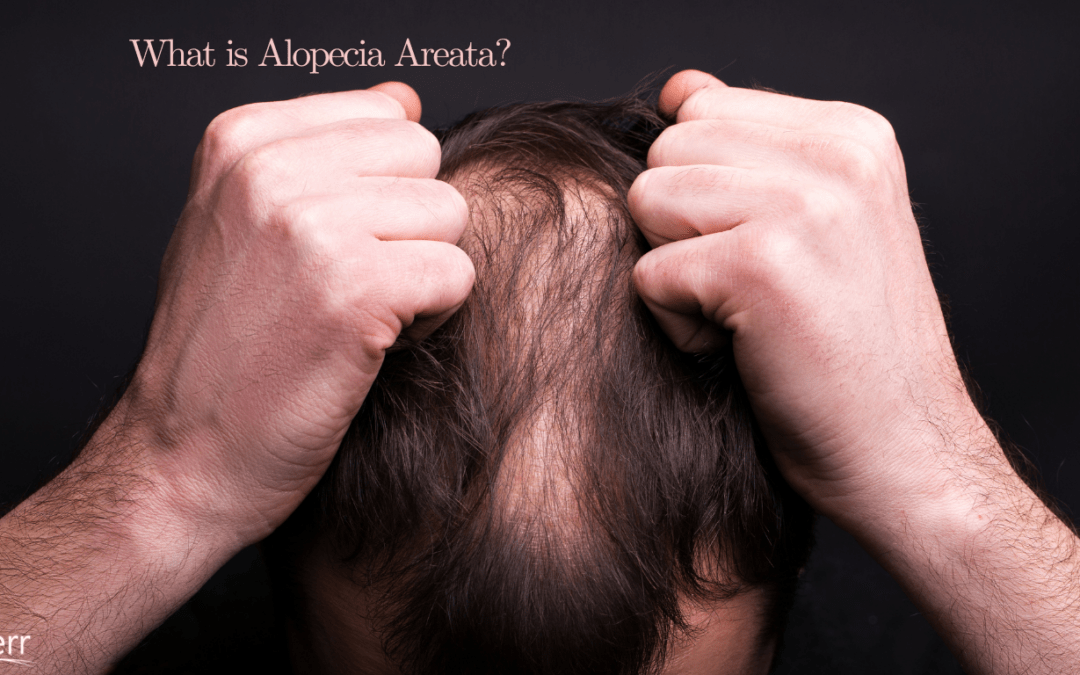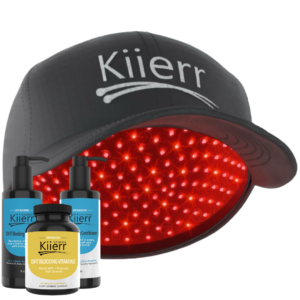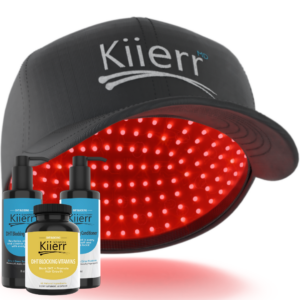If you’re here, you’re probably wondering about Alopecia Areata. What it is, what you can do about it and how to live with it. Well, alopecia areata is a common autoimmune disorder that results in hair loss. This condition can affect individuals of all ages, genders, and races, and its cause is not yet fully understood. While there is no cure for alopecia areata, there are various treatments available to manage the condition and promote hair regrowth. There are natural treatments and remedies that can be used to complement medical treatments or as standalone options. We’ll explore the causes and symptoms of alopecia areata, discuss things to avoid when dealing with this condition, and delve into the various treatment options, including natural remedies that can help with hair regrowth. Let’s get started on this journey to learn more about alopecia areata and how to manage it in a positive and proactive way.
Table of Contents
- 1 What is Alopecia Areata?
What is Alopecia Areata?
First, what exactly is alopecia areata? Alopecia areata is a type of autoimmune disorder that affects the hair follicles, resulting in hair loss that can occur anywhere on the body. The condition was first described in the 19th century by French dermatologist, Jean-Louis-Marc Alibert. Alopecia areata can affect individuals of any age, gender, or ethnicity, although it is most commonly diagnosed in young adults.
The condition can affect various areas of the body, including the scalp, beard, eyebrows, and eyelashes. In some cases, it can also lead to hair loss on other parts of the body, such as the arms, legs, and pubic area. The hair loss associated with alopecia areata is typically characterized by round or oval patches, although it can also result in complete hair loss on the scalp or body.
Diagnosis of alopecia areata typically involves a physical examination, medical history, and sometimes a scalp biopsy. During a physical exam, a healthcare professional will examine the affected area and may perform a pull test to see how easily the hair comes out. In some cases, a scalp biopsy may be recommended to confirm the diagnosis.
It’s important to note that alopecia areata does not discriminate based on age, gender, or ethnicity. Anyone can develop the condition, although it is more commonly diagnosed in individuals with a family history of autoimmune disorders or those with a personal history of other autoimmune conditions. If you suspect you may have alopecia areata, it’s important to speak with a healthcare professional to get an accurate diagnosis and start exploring your treatment options.
What Are the Main Causes of Alopecia Areata?
The exact causes of alopecia areata are not yet fully understood, but it is believed to be a combination of genetic and environmental factors.
Alopecia areata is classified into three main types: alopecia areata, alopecia totalis, and alopecia universalis. Alopecia areata is the mildest form and is characterized by small patches of hair loss on the scalp or body. Alopecia totalis is a more severe form that results in complete hair loss on the scalp. Alopecia universalis is the most severe form and results in complete hair loss on the scalp and body.
If you suspect you may have alopecia areata, there are a few signs and symptoms to look out for. The most common symptom is patchy hair loss on the scalp, but it can also occur on other areas of the body, such as the beard, eyebrows, and eyelashes. The affected areas may also be itchy or painful. In some cases, the hair may regrow on its own, but in other cases, it may not.
Can Alopecia Areata be Treated?

There are several treatment options available for alopecia areata, which can help manage the condition and promote hair regrowth. The best treatment plan will depend on the severity of the condition, the location of the hair loss, and other individual factors.
One common treatment for alopecia areata is the use of medications, such as corticosteroids, which can be applied topically, injected into the affected area, or taken orally. These medications work by reducing inflammation in the hair follicles and suppressing the immune system’s response. Corticosteroids are generally most effective in treating small areas of hair loss on the scalp.
Another treatment option is light therapy, which involves exposing the affected area to ultraviolet (UV) light. This treatment can be performed in a medical setting, or a home phototherapy device can be used. Light therapy works by stimulating hair growth and reducing inflammation in the hair follicles. It’s generally most effective for mild to moderate cases of alopecia areata.
In some cases, injections of medication directly into the affected area may be recommended. One commonly used medication for this is called corticosteroid triamcinolone acetonide, which can help to promote hair growth in the affected area. This treatment is generally most effective for small areas of hair loss on the scalp.
There are also natural treatments for alopecia areata, such as essential oils and herbal remedies, which can help promote hair growth and reduce inflammation in the hair follicles. However, it’s important to speak with a healthcare professional before using any natural treatments, as they may interact with other medications or cause allergic reactions.
It’s important to note that not all treatments work for everyone, and it may take some time to find the right treatment plan for you. It’s important to work closely with your healthcare professional to determine the best treatment options for your individual needs.
While there is no cure for alopecia areata, there are several treatment options available to help manage the condition and promote hair regrowth. Medications, light therapy, injections, and natural treatments can all be effective, depending on the severity of the condition and individual factors. By working with a healthcare professional to find the right treatment plan, many individuals with alopecia areata are able to manage their condition and regain their confidence.
Things to Avoid When You Have Alopecia Areata

When you have alopecia areata, it’s important to take steps to avoid things that could potentially worsen your condition or irritate your hair and hair follicles. While the exact triggers of alopecia areata are not yet fully understood, there are some things that may exacerbate the condition.
One thing to avoid is harsh hair treatments and styling products, such as perms, hair dyes, and straightening treatments. These treatments can cause damage to the hair and hair follicles, which can make alopecia areata worse. It’s also important to avoid tight hairstyles, such as braids and cornrows, which can pull on the hair and cause damage to the hair follicles.
Stress is also believed to be a potential trigger for alopecia areata, so it’s important to manage stress levels as much as possible. This can include practicing relaxation techniques, such as yoga and meditation, and engaging in regular exercise.
Additionally, some medications and medical conditions can cause hair loss, so it’s important to speak with your healthcare professional about any medications you are taking or underlying medical conditions you may have.
Are There Any Natural Treatments for Alopecia?

Natural treatments and remedies for alopecia areata can be a helpful complement to medical treatments. Here are some natural remedies that have been suggested to help with alopecia areata:
- Essential oils: Some essential oils, such as lavender, rosemary, and peppermint, have been suggested to promote hair growth and reduce inflammation in the hair follicles. A study published in 2016 found that a combination of lavender and tea tree essential oils applied topically on the scalp had a positive effect on hair regrowth in patients with alopecia areata.
- Herbal remedies: Certain herbs, such as ginseng, saw palmetto, and green tea, have been suggested to have anti-inflammatory properties and promote hair growth. A study published in 2011 found that a combination of ginseng and green tea extracts was effective in promoting hair growth in mice, and a study published in 2014 found that saw palmetto extract improved hair growth in men with androgenetic alopecia.
- Nutritional supplements: Nutritional deficiencies can sometimes contribute to hair loss, so taking certain supplements may be beneficial for promoting hair growth. For example, biotin, vitamin D, and iron have all been suggested to support hair health. A study published in 2015 found that a combination of omega-3 and omega-6 fatty acid supplements improved hair density and thickness in women with female pattern hair loss.
- Stress relief practices: Stress can be a trigger for alopecia areata, so finding ways to manage stress may be helpful in preventing hair loss. Practices such as meditation, yoga, and deep breathing exercises have been suggested to reduce stress levels and promote relaxation.
While these natural remedies may be helpful for some people with alopecia areata, it’s important to note that more research is needed to fully understand their effectiveness. It’s also important to speak with a healthcare professional before trying any natural remedies, as they may interact with other medications or cause allergic reactions.
Products that Can Help With Alopecia Areata
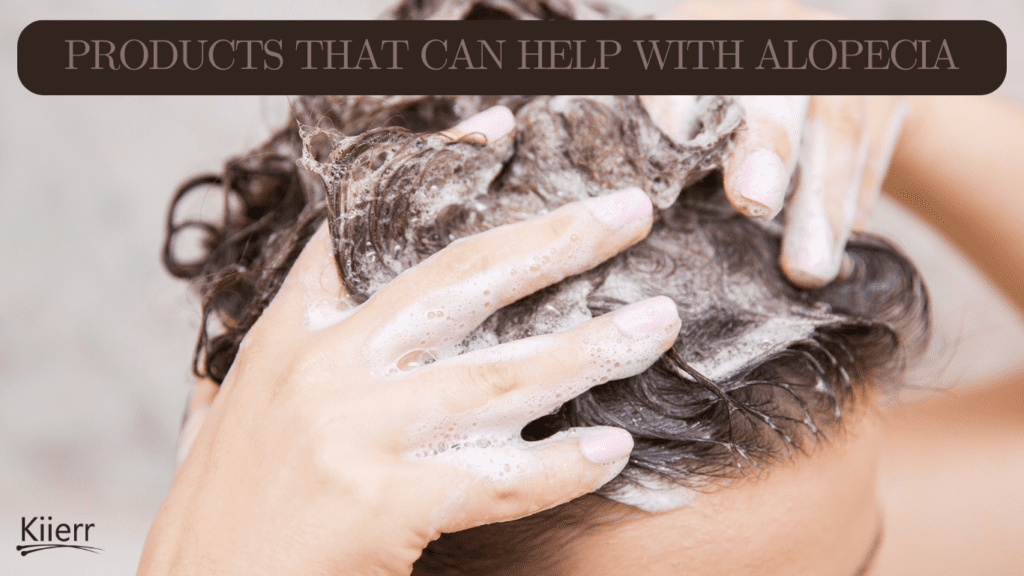
Laser caps, biotin supplements, collagen supplements, DHT blocking vitamins, DHT blocking shampoos, and hair growth conditioners such as Trichogen®VEG LS 9733 & DermaPep®Pepanagen-S have all been suggested to help with hair loss, including alopecia areata.
Laser caps use low-level laser therapy to stimulate hair growth, while biotin and collagen supplements provide important nutrients to support hair health. DHT blocking vitamins and shampoos work to reduce the levels of dihydrotestosterone (DHT), a hormone that can contribute to hair loss. Trichogen®VEG LS 9733 & DermaPep®Pepanagen-S conditioners contain peptides and plant-based extracts that have been suggested to promote hair growth and reduce inflammation in the scalp. These products may be a helpful addition to a comprehensive treatment plan for alopecia areata.
Why Use Kiier Products to Help With Your Hair Loss?
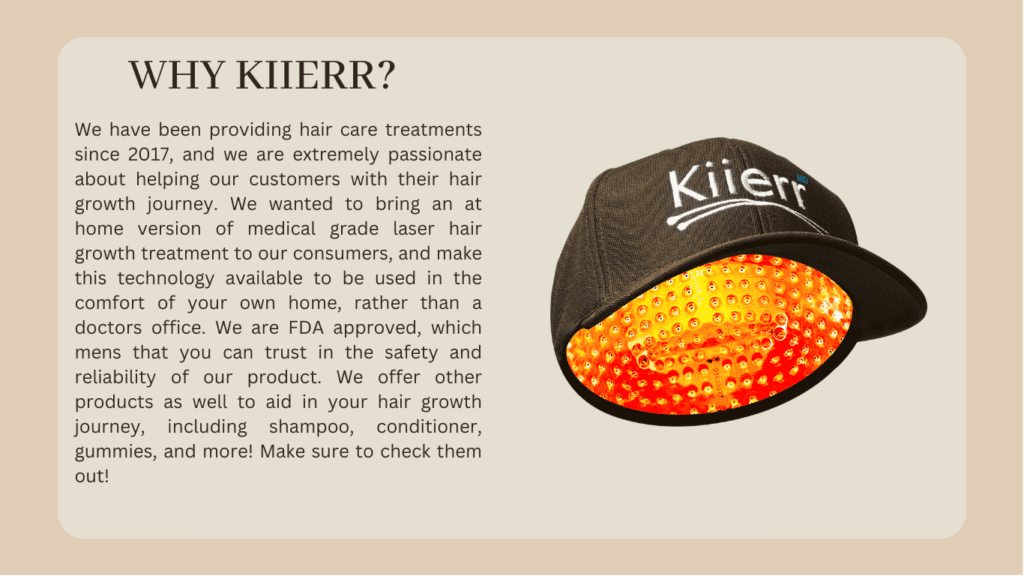
Kiier hair growth laser caps, supplements, shampoos, and conditioners are some of the best products available for people looking to improve their hair growth. Kiier’s laser caps use low-level laser therapy technology, which has been clinically proven to stimulate hair growth and improve hair density. In addition, Kiier’s hair growth supplements contain high-quality ingredients, such as biotin, collagen, and DHT blocking vitamins, which have been shown to improve hair health and promote hair growth.
But don’t just take our word for it – our customers love our products! Kiier has received countless positive reviews from satisfied customers who have seen real results from using our products. Our hair growth laser caps have been praised for their ease of use, effectiveness, and quality. Our supplements, shampoos, and conditioners have also received high praise from customers who have seen noticeable improvements in the thickness and fullness of their hair.
Kiier’s hair growth products are top-quality, effective, and backed by real customer reviews. Whether you’re struggling with hair loss due to alopecia areata or simply looking to improve the health and fullness of your hair, Kiier’s products can help you achieve your hair growth goals.
What Our Customers Have to Say
Maureen B.
I’m so thankful for the Kiierr cap!
In December 2019 my hair started falling out. I went to a dermatologist and was diagnosed with alopecia. She put me on finasteride and topical minoxidil. My hair seemed to improve but by the end of 2020 it began falling out again. I went back to the dermatologist and she said there was nothing more I could do since I had alopecia. I started researching alopecia treatments and I came across the Kiier Cap and decided to try it. It was risk free, so I had nothing to lose. Within 6 months I started to see a change. My hair was growing in where I had lost it. Each month my scalp improved. Not only was my hair growing but also getting thicker. In addition, I have not shed at all since I started wearing the cap! Many people have seen the difference in my hair. I have a new dermatologist who is amazed at my progress. She added the laser cap to her list of suggestions for treatment of alopecia. My hairdresser told me to keep up whatever it is I’m doing and my family/friends are thrilled for me. Hair loss is devastating so I’m thankful that the Kiierr Cap is available for people who have alopecia.
Aida D.
Very positive experience and results!
I have a very positive experience with Kiierr from the time I ordered the product up to now. Kiierr has been very prompt in sending the item I ordered and recently, Kiierr customer service has been very helpful in resolving my problem with mirror battery power pack. I just received a notification that a replacement will be arriving in two days, without costing me any penny, as it was under warranty. I am very pleased with no hassle service. Before using Kiierr laser cap, I have baldness on my head diagnosed as alopecia areata. Each time I take a shower, significant amount of hair loss was very discouraging sight. And it affects my self-esteem, confidence and my social life. Now, 8 months after using the laser cap, I am happy to say that my hair has been almost restored, so as my self-esteem and confidence. I do not have baldness, my hair seems healthy and I do not notice anymore hair loss when I take a shower. I am so happy with my Kiierr laser cap that I recommended it to my friend who said her hair is thinning. She recently purchased a similar laser cap as I have and she is already seeing a positive result.

